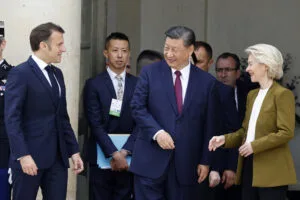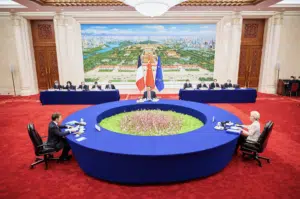Brussels – Geopolitics and trade relations: The European Union and China seek to pick up the threads of a thorny relationship by tackling the two most complex issues still at the top of the agenda, despite three meetings in a year between the European Commission President Ursula von der Leyen and Chinese leader Xi Jinping. This was evidenced by the long-awaited trilateral summit hosted in Paris today (May 6) by the French President, Emmanuel Macron, which revealed, on the one hand, the need to have “good mutual relations,” but also the urgency for Brussels to “address the distortions” caused by Beijing “with the defence instruments we have, if necessary.”

All this was put on the table by the President of the EU Commission, who, in her introductory speech at the Paris trilateral, reminded how “our engagement is key to ensure mutual respect, avoiding misunderstanding and find joint solutions to global challenges.” For these reasons, an interest remains in “demonstrating that our engagement delivers.” In particular, according to von der Leyen, “China is important for the European Union to tackle the major global challenges,” such as “the joint fight against climate change and the determination to protect biodiversity and implement ocean governance.” This message is identical to the one conveyed in the meeting in the same format in Beijing in spring 2023, but still the basis for not exacerbating a very delicate relationship with the Chinese counterpart.
A spirit of cooperation needed to deal with the nonetheless undeniable frictions between the two sides also emerged from the French host: “The international situation needs this Euro-Chinese dialogue more than ever,” Macron claimed of the effort to “try to overcome current concerns” and avert a “logic of disaggregation that would be economically harmful.” For his part, President Xi Jinping spoke of a “strengthening of consensus and strategic coordination” between the European Union and China, which, “as two major world powers, must remain partners, pursue dialogue and cooperation, deepen communication and mutual trust.” The two most crucial issues on the table—to which a definitive solution has yet to be found—are enormous in their scope and potentially overwhelming for global balances.
From Ukraine to East Asia

The first thorny issue for EU-China relations is undoubtedly the “functioning of the rules-based international order in a very turbulent environment in Europe, the Middle East, and East Asia.” The tensions in the Taiwan Strait remain only between the lines, while the Russian invasion of Ukraine finds ample space in von der Leyen’s words: “We are determined to stop the war of aggression and to establish a just and lasting peace.” Relying on a “common interest in peace and security” and recalling President Xi Jinping’s “important role in the de-escalation of the Kremlin’s irresponsible nuclear threat,” the appeal to Beijing is still to “use all its influence on Russia” to end the conflict. Especially crucial in this context is the total halt of the supply of Chinese dual-use goods that end up on the battlefield: “More effort is needed, given the enormous threat this war poses to both Ukraine and the EU, this issue has an impact” on relations between the EU and Beijing, is von der Leyen’s warning.
The second scenario of instability in the international order is the Middle East, “which is of enormous concern to both sides” and for which “no effort must be spared for the de-escalation of tension and to avoid a wider conflict in the region.” While Israel ordered the evacuation of Rafah in the Gaza Strip ahead of an imminent ground attack, the number one EU executive reiterated the call for a “ceasefire and the release of hostages,” while between Brussels and Beijing, “we work to provide all possible humanitarian support and for the two-state solution,” which also for Xi Jinping “is the only way” to end the conflict in Palestine. Not to be underestimated is also the “direct threat from Iran,” on which again “China can play an important role in limiting the irresponsible proliferation of missiles and drones,” von der Leyen urged.
The EU-China Economic Relations
In addition to scenarios of geopolitical instability and the different approaches of the two partners, no one hides that the most fragile issue in the EU-China relationship is economic and trade competition. “Our daily trade volume is about 2.3 billion euros, but this relationship is being put to the test,” von der Leyen reminded Xi Jinping, citing “state-induced overcapacity, unequal market access, and excessive dependence.” Suffice it to mention that the past decade has seen a gradual imbalance in the trade, with the Union’s deficit more than tripling and nearly reaching 400 billion euros by 2022: “The imbalance remains significant and is a matter of great concern but, as we have demonstrated, we will defend our economies if necessary.”
Inevitable reference is made to products receiving state subsidies in China, “such as electric vehicles or steel,” that “are flooding the European market.” A series of investigations into Beijing’s subsidies have been launched in Brussels, starting precisely with electric cars, for which the EU Commission could impose provisional duties if illegal subsidies are found along value chains. “China continues to support the manufacturing sector massively, and this, combined with domestic demand that is not increasing, means that the world cannot absorb Chinese production,” is von der Leyen’s attack, which made known the request to the Chinese government to “address this overcapacity”. At the same time, “we will coordinate with G7 countries and emerging economies that face distortions” caused by Beijing’s economic and trade policy. However, the Chinese leader cut short, claiming that “the problem of overcapacity does not exist” in China.
However, this issue closely concerns the Union and its internal market since “access to markets must be reciprocal.” The approach at the moment is to “discuss how to achieve effective progress.” At the same time “we make use of our advocacy tools as necessary.” Demonstrating this is the decision last April 24 to launch the first survey through the International Procurement Facility in the medical device market, “We cannot accept practices that distort the market and can lead to deindustrialization here in Europe.” And finally, the issue of supply chains, particularly the “over-dependence” on critical raw materials. It is precisely on this front that the Commission’s number one claims for the success of the new approach outlined in early 2023: “We have negotiated several agreements with many third countries from which we obtain critical raw materials; this is de-risking in practice,” von der Leyen recalled, greeting the trilateral summit with a message for the future: “Our market remains open to fair competition and investment; it is not good for Europe if it damages our security and makes us vulnerable”.
English version by the Translation Service of Withub







